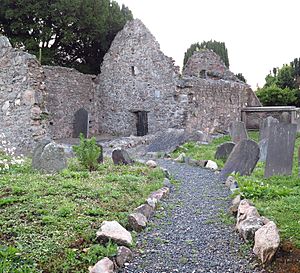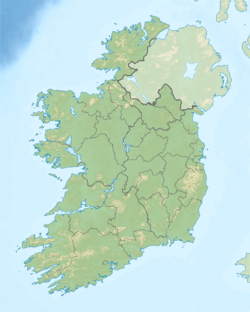Kilcoole Church facts for kids
Quick facts for kids Kilcoole Church |
|
|---|---|
|
Cill Chomhghaill
|
|

Kilcoole Church in 2017
|
|
| 53°06′26″N 6°03′46″W / 53.107089°N 6.062804°W | |
| Location | Lott Lane, Kilcoole, County Wicklow |
| Country | Ireland |
| Denomination | Pre-Reformation Catholic |
| History | |
| Founded | 12th century |
| Dedication | Mary, mother of Jesus |
| Architecture | |
| Style | Celtic Christianity |
| Years built | 12th century |
| Specifications | |
| Length | 23 m (75 ft) |
| Width | 6 m (20 ft) |
| Height | 9 m (30 ft) |
| Number of floors | 1 |
| Floor area | 140 m2 (1,500 sq ft) |
| Materials | stone |
| Administration | |
| Diocese | Dublin |
Kilcoole Church, also known as Old Kilcoole Church, is a very old church located in Kilcoole, County Wicklow, Ireland. It is considered a National Monument, which means it's a special historical site protected by the country.
Where is Kilcoole Church?
Kilcoole Church can be found on Lott Lane, right in the middle of Kilcoole village. It's about 1.5 kilometers (about a mile) west of the sea. This church is special because it's the most eastern National Monument in the Republic of Ireland!
A Look Back in Time: The Church's History
This church gets its name from a saint called Comgall. It was built way back in the 12th century, which means it's over 800 years old! The church was dedicated to Mary, mother of Jesus. In 1707, a very important person named Thady Byrne was buried here. He was a senior member of the O'Byrne family from Ballygannon.
What Does the Church Look Like Inside?
The church is made up of two main parts: the nave and the chancel. The nave is the main area where people would sit. The chancel is the part of the church near the altar. The chancel probably had a special stone roof that was steeply angled.
Inside the nave, you can see a square baptismal font. This is a basin used for baptisms. There is also a cross slab, which is a stone with a cross carved into it. You can also spot a small, round-headed window on the south wall.
Later, a two-story living area was added to the west side of the church. About 100 meters (about 100 yards) to the northeast of the church, there is also a holy well.
 | William M. Jackson |
 | Juan E. Gilbert |
 | Neil deGrasse Tyson |


